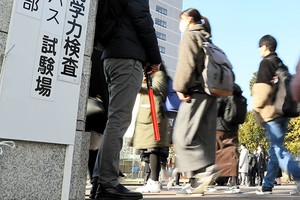August 8, 2022 at 12:27 JST
 From left: Japan’s trade and economy minister, Koichi Hagiuda, Foreign Minister Yoshimasa Hayashi, U.S. Secretary of State Antony Blinken and U.S. Commerce Secretary Gina Raimondo meet reporters after their “two-plus-two” economic ministerial meeting in Washington on July 29. (Provided by the Foreign Ministry)
From left: Japan’s trade and economy minister, Koichi Hagiuda, Foreign Minister Yoshimasa Hayashi, U.S. Secretary of State Antony Blinken and U.S. Commerce Secretary Gina Raimondo meet reporters after their “two-plus-two” economic ministerial meeting in Washington on July 29. (Provided by the Foreign Ministry)
Japan and the United States have begun a new round of regular ministerial-level talks on economic and national security issues. With the international order facing a raft of serious challenges, there is a strong case for closer cooperation in these areas between the two allies.
If, however, the two leading economic powers undercut the principle of free trade in their single-minded pursuit of security, the foundation of the world economy, including their own, would be weakened. Exceptions to the principle should be limited to the very minimum necessary.
On July 29, top foreign and economic policy officials of both nations held the inaugural ministerial meeting of the Japan-U.S. Economic Policy Consultative Committee, or the so-called economic “two-plus-two” meeting, in Washington.
The new economic security dialogue was rolled out with the recognition that “foreign and national security policies and economic policy are now inseparable and fundamentally linked,” in the words of Koichi Hagiuda, Japan’s trade and economy minister.
The joint statement issued by the four officials--Japanese Foreign Minister Yoshimasa Hayashi, U.S. Secretary of State Antony Blinken and U.S. Commerce Secretary Gina Raimondo, as well as Hagiuda--left no doubt that it is aimed at pushing back against China.
“The ministers expressed grave concern about, and opposition to, harmful uses of economic influence,” the statement said. They agreed to promote the U.S.-led Indo-Pacific Economic Framework for Prosperity (IPEF) and enhance bilateral cooperation to foster supply chain resilience in strategic sectors, including semiconductors.
In addition to increasingly fierce confrontation between Washington and Beijing, Russia’s invasion of Ukraine has raised concerns about economic security. It is now inevitable that certain restrictions on international economic transactions will be imposed to prevent the theft of vital and sensitive military technologies and secure stable energy supplies.
It should not be forgotten, however, that taking such measures carries the risk of undermining free trade principles and causing harm to the global economy.
Tokyo and Washington plan to shell out huge amounts of public funds to support the production and development of computer chips and storage batteries. But World Trade Organization rules prohibit state subsidies that hamper fair trade. Both countries have severely criticized China for providing shady government subsidies to state-owned enterprises.
It is hard to claim that the two governments have offered convincing explanations about how their planned support to key domestic industries is consistent with their traditional position on the issue.
Japan and the United States say they will seek to build “a rules-based international economic order.” But Washington still maintains unfair and unreasonable additional tariffs that were imposed on imports of steel and aluminum products by the previous Trump administration. The bilateral free trade agreement reached during the Trump administration does not measure up to the tariff elimination rate required for such a trade deal under the WTO rules.
The two nations’ calls for compliance with international trade rules will not carry weight unless they demonstrate their solid commitment to them.
China, in the meantime, is showing no signs of shedding its propensity to distort trade for political purposes. Beijing is now considering the introduction of new regulations designed to ban the government and infrastructure companies from purchasing office equipment from foreign manufacturers.
To be sure, the WTO allows countries to make exceptions to its trade rules on security grounds. But abuse of this provision would make a mockery of free trade. Major economic powers must not commit the folly of providing incentives for the escalation of such abuse among trade partners.
This imperative requires an effective system to ensure independent evaluations of all such exceptions for their legitimacy.
The first and foremost trade policy challenge for Japan and the United States is to revive the WTO’s moribund dispute settlement function as quickly as possible.
--The Asahi Shimbun, Aug. 5




















A peek through the music industry’s curtain at the producers who harnessed social media to help their idols go global.
A series based on diplomatic documents declassified by Japan’s Foreign Ministry
Here is a collection of first-hand accounts by “hibakusha” atomic bomb survivors.
Cooking experts, chefs and others involved in the field of food introduce their special recipes intertwined with their paths in life.
A series about Japanese-Americans and their memories of World War II